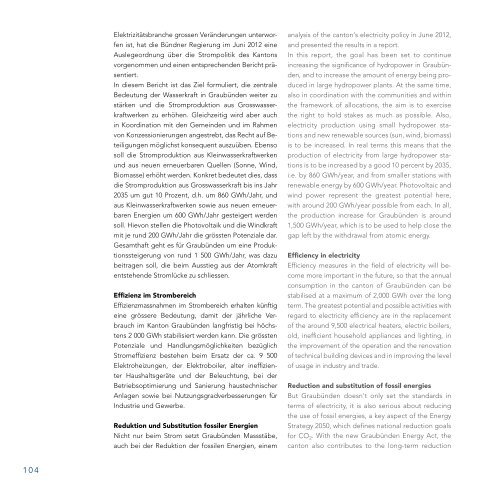Energiewende
Sie wollen auch ein ePaper? Erhöhen Sie die Reichweite Ihrer Titel.
YUMPU macht aus Druck-PDFs automatisch weboptimierte ePaper, die Google liebt.
Elektrizitätsbranche grossen Veränderungen unterworfen<br />
ist, hat die Bündner Regierung im Juni 2012 eine<br />
Auslegeordnung über die Strompolitik des Kantons<br />
vorgenommen und einen entsprechenden Bericht präsentiert.<br />
In diesem Bericht ist das Ziel formuliert, die zentrale<br />
Bedeutung der Wasserkraft in Graubünden weiter zu<br />
stärken und die Stromproduktion aus Grosswasserkraftwerken<br />
zu erhöhen. Gleichzeitig wird aber auch<br />
in Koordination mit den Gemeinden und im Rahmen<br />
von Konzessionierungen angestrebt, das Recht auf Beteiligungen<br />
möglichst konsequent auszuüben. Ebenso<br />
soll die Stromproduktion aus Kleinwasserkraftwerken<br />
und aus neuen erneuerbaren Quellen (Sonne, Wind,<br />
Biomasse) erhöht werden. Konkret bedeutet dies, dass<br />
die Stromproduktion aus Grosswasserkraft bis ins Jahr<br />
2035 um gut 10 Prozent, d.h. um 860 GWh/Jahr, und<br />
aus Kleinwasserkraftwerken sowie aus neuen erneuerbaren<br />
Energien um 600 GWh/Jahr gesteigert werden<br />
soll. Hievon stellen die Photovoltaik und die Windkraft<br />
mit je rund 200 GWh/Jahr die grössten Potenziale dar.<br />
Gesamthaft geht es für Graubünden um eine Produktionssteigerung<br />
von rund 1 500 GWh/Jahr, was dazu<br />
beitragen soll, die beim Ausstieg aus der Atomkraft<br />
entstehende Stromlücke zu schliessen.<br />
Effizienz im Strombereich<br />
Effizienzmassnahmen im Strombereich erhalten künftig<br />
eine grössere Bedeutung, damit der jährliche Verbrauch<br />
im Kanton Graubünden langfristig bei höchstens<br />
2 000 GWh stabilisiert werden kann. Die grössten<br />
Potenziale und Handlungsmöglichkeiten bezüglich<br />
Stromeffizienz bestehen beim Ersatz der ca. 9 500<br />
Elektroheizungen, der Elektroboiler, alter ineffizienter<br />
Haushaltsgeräte und der Beleuchtung, bei der<br />
Betriebsoptimierung und Sanierung haustechnischer<br />
Anlagen sowie bei Nutzungsgradverbesserungen für<br />
Industrie und Gewerbe.<br />
Reduktion und Substitution fossiler Energien<br />
Nicht nur beim Strom setzt Graubünden Massstäbe,<br />
auch bei der Reduktion der fossilen Energien, einem<br />
analysis of the canton‘s electricity policy in June 2012,<br />
and presented the results in a report.<br />
In this report, the goal has been set to continue<br />
increasing the significance of hydropower in Graubünden,<br />
and to increase the amount of energy being produced<br />
in large hydropower plants. At the same time,<br />
also in coordination with the communities and within<br />
the framework of allocations, the aim is to exercise<br />
the right to hold stakes as much as possible. Also,<br />
electricity production using small hydropower stations<br />
and new renewable sources (sun, wind, biomass)<br />
is to be increased. In real terms this means that the<br />
production of electricity from large hydropower stations<br />
is to be increased by a good 10 percent by 2035,<br />
i.e. by 860 GWh/year, and from smaller stations with<br />
renewable energy by 600 GWh/year. Photovoltaic and<br />
wind power represent the greatest potential here,<br />
with around 200 GWh/year possible from each. In all,<br />
the production increase for Graubünden is around<br />
1,500 GWh/year, which is to be used to help close the<br />
gap left by the withdrawal from atomic energy.<br />
Efficiency in electricity<br />
Efficiency measures in the field of electricity will become<br />
more important in the future, so that the annual<br />
consumption in the canton of Graubünden can be<br />
stabilised at a maximum of 2,000 GWh over the long<br />
term. The greatest potential and possible activities with<br />
regard to electricity efficiency are in the replacement<br />
of the around 9,500 electrical heaters, electric boilers,<br />
old, inefficient household appliances and lighting, in<br />
the improvement of the operation and the renovation<br />
of technical building devices and in improving the level<br />
of usage in industry and trade.<br />
Reduction and substitution of fossil energies<br />
But Graubünden doesn‘t only set the standards in<br />
terms of electricity, it is also serious about reducing<br />
the use of fossil energies, a key aspect of the Energy<br />
Strategy 2050, which defines national reduction goals<br />
for CO 2 . With the new Graubünden Energy Act, the<br />
canton also contributes to the long-term reduction<br />
104





